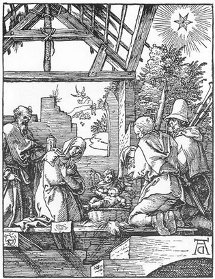The First Christmas: Why Did God's Son Come to Planet Earth?
 Is there anything special about planet Earth that God the Father would send His Son, Jesus Christ the Lord, through Whom the universe was created (John 1:3), all the way down from the third heaven to this tiny speck in the ocean of space?
Is there anything special about planet Earth that God the Father would send His Son, Jesus Christ the Lord, through Whom the universe was created (John 1:3), all the way down from the third heaven to this tiny speck in the ocean of space?
First of all, how far did He have to come to get here? The psalmist asks, “Who is like unto the LORD our God, who dwelleth on high, Who humbleth himself to behold the things that are in heaven, and in the earth!” (Ps. 113:5-6, KJV).
If God must humble Himself to behold the universe, how much more must He humble Himself to find the Milky Way (one of billions of galaxies), and the solar system of planets orbiting our sun (one of a hundred billion stars in our galaxy) and then planet Earth (one of the smaller planets)? The universe is infinite in its magnitude as far as human beings are concerned, for God has assured us that “if heaven above can be measured … I will also cast off all the seed of Israel for all that they have done, saith the LORD” (Jer. 31:37). Which means, of course, that we can never measure it! No, “the host of heaven cannot be numbered” (Jer. 33:22), for “the stars of the heaven” are as numerous as “the sand which is upon the sea shore” (Gen. 22:17).
Then, why did God’s Son come to our tiny planet Earth? The answer is biblically clear: only the Earth is inhabitable and has inhabitants. The prophet Isaiah informs us that God “formed the earth and made it; He hath established it, he created it not in vain [like all the other planets in the universe], he formed it to be inhabited” (Isa. 45:18). But – amazing to contemplate – not only plants and animals live here, but also human beings who possess the image and likeness of God! That is why the Creator of everything (Col. 1:16) by-passed all the other galaxies, all the other stars in our galaxy and the bigger planets in our solar system (Jupiter, Saturn, Uranus and Neptune) and came here to become a permanent member of the human race inside the body of a Jewish woman. That is the permanent wonder of Christmas.
Our personal existence began here (for Adam and Eve by creation, and for the rest of us by procreation). But God’s Son existed as the Second Person of the Godhead forever before He added a human nature (body, soul and spirit) to His divine nature: “The Word [God’s Son] was made flesh [human], and dwelt among us, (and we beheld His glory, the glory as of the only begotten of the Father,) full of grace and truth” (John 1:14).
Yes, that is the message of Christmas: the beloved Son of God rejoiced with the Father for all eternity “before the world was” (John 17:5), and then 2,000 years ago came all the way down from “the third heaven” (2 Cor. 12:2) to this exclusively inhabited planet to pay in full the penalty for sin which we could never pay. What love, what mercy and what grace!
As one has so appropriately observed: “We had a debt we could not pay. He paid a debt He did not owe” (author unknown).
“For God so loved the world, that he gave his only begotten Son, that whosoever believeth in him should not perish, but have everlasting life” (John 3:16).
Merry Christmas!
Dr. John C. Whitcomb has been a professor of Old Testament and theology for more than 50 years and is widely recognized as a leading biblical scholar. He taught at Grace Theological Seminary (Winona Lake, IN) from 1951-1990 and gained much recognition for his work on [amazon 0875523382] (Presbyterian and Reformed Publishing Company), which he co-authored with Dr. Henry Morris in 1961. That book has been credited as one of the major catalysts for the modern Biblical creationism movement. His ministry homepage is Whitcomb Ministries, and his sermons are available at SermonAudio.com.
- 5 views


Discussion